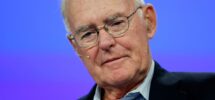On Friday, President Donald Trump instructed his administration to “revoke Hong Kong’s preferential treatment as a separate customs and travel territory from the rest of China.” The decree came days after Secretary of State Mike Pompeo reported that Hong Kong could no longer be said to have “a high degree of autonomy” from Beijing because of the Chinese Communist Party’s move to implement a national security law on Hong Kong.
Hong Kong’s special economic privileges were set out in the U.S.’s Hong Kong Policy Act 1992—a bill designed to ensure the economy of the former British colony continued as normal after its return to Chinese sovereignty in 1997.
Details on which privileges will be revoked have yet to be announced and the White House hasn’t provided a timeline for implementing the change. While the world awaits more specifics, here’s what could and could not be affected as Hong Kong’s special status is revoked:
1. Tariffs
Currently, exports to the U.S. from Hong Kong are exempt from the tariffs the White House has loaded upon imports from China. The White House could decide to now extend those tariffs to goods from Hong Kong, too, although it would impact relatively few items. According to Hong Kong Financial Secretary Paul Chan, only 2% of Hong Kong’s exports went to the U.S—accounting for 0.1% of the city’s total exports.
Despite the minimal impact, Iris Pang, chief economist at ING Greater China, says imposing tariffs on Hong Kong exports would also hurt U.S. consumers by raising the cost of those goods.
The World Trade Organization also continues to recognize Hong Kong as a separate entity from mainland China so, although the U.S. is revoking its own recognition of Hong Kong’s autonomy, other countries will continue to trade with the city under WTO rules.
2. Free dollar exchange
Currently, the Hong Kong dollar can be “freely exchanged” with the U.S. dollar. The free flow of currency is the foundation of Hong Kong’s financial services industry (which accounted for 20% of the city’s GDP in 2018). Eliminating the city’s access to the dollar could jeopardize $72 billion in value added to the economy.
However, most economists think Washington will not opt for the “nuclear option” of prohibiting the exchange of Hong Kong and U.S. dollars. For one, even mainland China has free access to the U.S. dollar, so there’s no logic to denying the same right to Hong Kong.
More importantly, doing so could damage U.S. interests, as businesses in Hong Kong would likely switch operations to another major currency, such as the Euro or possible the Yuan, weakening the status of the U.S. dollar in Asia.
It’s also worth noting that the U.S. can’t interfere with Hong Kong dollar’s peg. The Hong Kong-U.S. dollar exchange rate has been set at roughly 7:1 since 1983 and maintaining the peg is the Hong Kong government’s own decision. In 1998, the Hong Kong government spent $15 billion maintaining the peg as short sellers, led by George Soros, tried to break it.
The Hong Kong Monetary Authority (HKMA) Chief Executive Eddie Yue Wai-man said the HKMA has $440 billion in reserves available to maintain the peg, which will “remain the bedrock of [Hong Kong’s] financial system.”
3. Restricted tech
The U.S.’s 1992 Hong Kong bill says the U.S. should continue to “support access by Hong Kong to sensitive technologies”—a category of tech that could include components for developing A.I. or military weapons.
“Knowledge-intensive products from the U.S. only make up around 5% of Hong Kong’s total imports. But restricting the ability of Hong Kong-based firms to source sensitive products would remove one of Hong Kong’s distinct advantages as a business location relative to mainland China,” Mark Williams, chief Asia economist at Capital Economics, wrote in a note last Thursday.
Some technology imported to Hong Kong is re-exported to mainland China, so blacklisting Hong Kong would close that loophole. However, denying Hong Kong business and universities access to cutting-edge tech could jeopardize the city’s ambitions to become an “innovation hub” too.
4. Sanctions
In addition to rolling back Hong Kong’s privileged status, Trump also said the U.S. would “sanction PRC and Hong Kong officials directly or indirectly involved in eroding Hong Kong’s autonomy.”
Such vague parameters mean that any member of Hong Kong’s current administration could be subject to sanctions, as could the head of the Hong Kong Macau Affairs Office or the Hong Kong Liaison Office—both of whom are officials appointed by mainland China to oversee Hong Kong affairs.
According to the U.S. Hong Kong Human Rights and Democracy Act, passed last year, sanctions could include freezing the U.S. assets of a targeted individual or denying them entry to the U.S.
Response from China
On Monday, Beijing issued a measured rebuff of Trump’s decree. Foreign Ministry spokesperson Zhao Lijian told reporters at a regular press conference that any “words and deeds from the United States that harm the interests of China will be resolutely counterattacked by the Chinese side.”
Meanwhile markets reacted strongly to the news; investors were pleased with Trump’s relatively measured response. On Monday Hong Kong’s benchmark Hang Seng index posted its highest gains since March, rising 3.4%, while the Shanghai Composite grew 2.2%. “The collective sigh of relief in Asia is palpable this morning,” OANDA senior market analyst for APAC, Jeffrey Halley, said in a note.
“As expected, the President withdrew Hong Kong’s special status over the new China imposed security law. What he did not do, however, was withdraw from the U.S.-China phase one trade agreement signed in January. Nor did he impose sanctions on Chinese officials or persons connected to the regime.”
More must-read international coverage from Fortune:
- 4 more years of Trump may accelerate China’s rise, says former UN Security Council president
- “Nuclear option”: How the U.S. could leverage Hong Kong to hurt Beijing
- London’s Savile Row exported bespoke British suits to the 1%. Can it survive in a socially distanced world?
- To recover from COVID-19, Europe wants more 5G
- WATCH: The global crisis in recycling
- Subscribe to Fortune’s Eastworld newsletter for expert insight on what’s dominating business in Asia.


